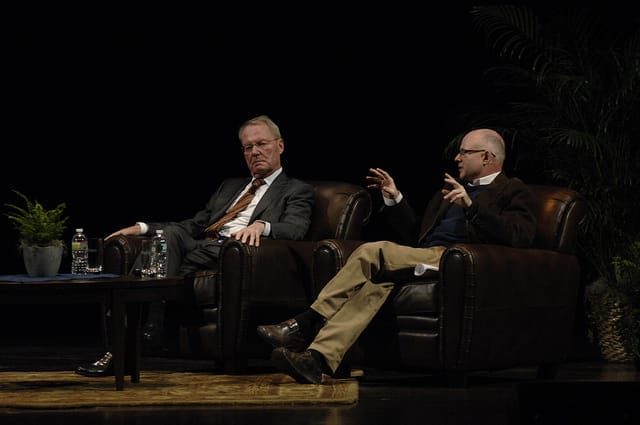The main attraction of last fall’s new MGMT 611/612 courses was an intellectual sparring match between two Hanses—Hans Humes, chairman and CEO of Greylock Capital Management LLC, versus Hans-Olaf Henkel, professor of international management at the University of Mannheim, senior adviser to Bank of America and the previous head of the German Federation of Industries. It occurred on Dec. 7 at the “Wharton School Global Summit: Euro 2013,” the culminating event of the new MGMT courses.
The Summit brought about 850 MBA students into Irvine Auditorium to listen to the debate. Some of the students were taking the course in their fall semester. For others, the summit was the opening event of the spring version of the courses.
Reflecting upon the event, Witold Henisz, the Deloitte & Touche Professor of Management and co-lead instructor for the course, stresses that no other one-day event on campus—save convocation or graduation—touches that many students and in a meaningful way. The goal of the program is to connect the classroom with the “front pages of the newspaper,” Henisz says, and he believes that was largely accomplished in the course’s first semester.
“For a big pilot, I was really pleased with it,” he says.
MGMT 611 integrates three former management classes. The first major part of the new course examines issues central to the competitive position of an enterprise. The second part emphasizes the social elements of motivation and leadership. The third part focuses on the deep and persistent cross-national differences in economic, political and social institutions that affect organizations.
The emphasis in MGMT 612 is on managing the emerging (rather than established) enterprise, according to Henisz, but the core pedagogical points are relatively similar.
“The context is, however, drawn more heavily from small, nontraditional and entrepreneurial companies,” he says.
“In the new MBA core … there are two tracks of the required MGMT class, 611 and 612. Each track is offered in the fall and spring. The Global Summit was a combined requirement for students in either track in either semester,” Henisz explains.
That morning before the Hanses’ debate, the students presented capstone team papers, in which they integrated material across the three course “chunks” to examine the drivers of value creation of a firm of their choice. Following the summit, the students broke into discussion groups.
“There was a lot of insight generated,” Henisz reports.
Speaking of insights, another unique aspect of the course was a video produced in conjunction with the summit and viewed by the students before the great debate. The video was the sum of dozens of interviews conducted about the eurozone crisis with the world’s business and economic elite, many of them alumni.
“It was great that we were able to use the video to hit the major themes of the course,” Henisz says. Alumni are living the themes, which reinforces the importance of the course to the students.
Henisz was excited to have been able to connect the alumni into the Wharton Global Summit and MGMT 611. The event was livestreamed to hundreds of alumni in December.
To help plan the course’s next iteration, Henisz aims to tap into that alumni energy again with interviews at the Global Alumni Forum in Tokyo.
—By Matthew Brodsky

























